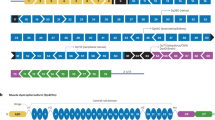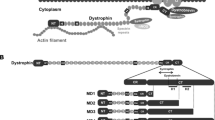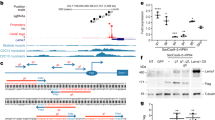Abstract
DUCHENNE and Becker muscular dystrophy (DMD and BMD) are X-linked recessive diseases caused by defective expression of dystrophin1,2. The mdx mouse, an animal model for DMD, has a mutation that eliminates expression of the 427K muscle and brain isoforms of dystrophin1,3,4. Although these animals do not display overt muscle weakness or impaired movement, the diaphragm muscle of the mdx mouse is severely affected and shows progressive myofibre degeneration and fibrosis which closely resembles the human disease5,6. Here we explore the feasibility of gene therapy for DMD by examining the potential of a full-length dystrophin transgene to correct dystrophic symptoms in mdx mice. We find that expression of dystrophin in muscles of transgenic mdx mice eliminates the morphological and immunohistological symptoms of muscular dystrophy. In addition, overexpression of dystrophin prevents the development of the abnormal mechanical properties associated with dystrophic muscle without causing deleterious side effects. Our results provide functional evidence for the feasibility of gene therapy for DMD.
This is a preview of subscription content, access via your institution
Access options
Subscribe to this journal
Receive 51 print issues and online access
$199.00 per year
only $3.90 per issue
Buy this article
- Purchase on Springer Link
- Instant access to full article PDF
Prices may be subject to local taxes which are calculated during checkout
Similar content being viewed by others
References
Hoffman, E. P., Brown, R. H. Jr & Kunkel, L. M. Cell 51, 919–928 (1987).
Ahn, A. H. & Kunkel, L. M. Nature Genet. 3, 283–291 (1993).
Sicinski, P. et al. Science 244, 1578–1580 (1989).
Cox, G. A., Phelps, S. F., Chapman, V. M. & Chamberlain, J. S. Nature Genet. 4, 87–93 (1993).
Partridge, T. Neuropathol. appl. Neurobiol. 17, 353–363 (1991).
Stedman, H. H. et al. Nature 352, 536–539 (1991).
Lee, C. C., Pearlman, J. A., Chamberlain, J. S. & Caskey, C. T. Nature 349, 334–336 (1991).
Jaynes, J. B., Chamberlain, J. S., Buskin, J. N., Johnson, J. E. & Hauschka, S. D. Molec. cell Biol. 6, 2855–2864 (1986).
Johnson, J. E., Wold, B. J. & Hauschka, S. D. Molec. ceff. Biol. 9, 3393–3399 (1989).
Ervasti, J. M., Ohlendieck, K., Kahl, S. D., Gaver, M. G. & Campbell, K. P. Nature 345, 315–319 (1990).
Ervasti, J. M. & Campbell, K. P. Cell 66, 1121–1131 (1991).
Ibraghimov-Beskrovnaya, O. et al. Nature 355, 696–702 (1992).
Ohlendieck, K. & Campbell, K. P. J. Cell Biol. 115, 1685–1694 (1991).
Ohlendieck, K. et al. Neurology 43, 795–800 (1993).
Matsumura, K. et al. Nature 359, 320–322 (1992).
Matsumura, K., Ervasti, J. M., Ohlendieck, K., Kahl, S. & Campbell, K. P. Nature 360, 588–591 (1992).
Chapman, V. M., Miller, D. M., Armstrong, D. & Caskey, C. T. Proc. natn. Acad. Sci. U.S.A. 86, 1292–1296 (1989).
Watkins, S. C. Hoffman, E. P., Slayter, H. S. & Kunkel, L. M. Muscle Nerve 12, 861–868 (1989).
Wells, D. J. et al. Hum. molec. Genet. 1, 35–40 (1992).
Ragot, T. et al. Nature 361, 647–650 (1993).
Emery, A. E. H. Duchenne Muscular Dystrophy (Oxford Monog. Med. Genet. No. 15, Oxford Medical, 1987).
Hogan, B., Constantini, F. & Lacey, E. Manipulating the Mouse Embryo: A Laboratory Manual (Cold Spring Harbor Laboratory Press, New York, 1986).
Chamberlain, J. S., Phelps, S. F., Cox, G. A., Maichele, A. J. & Greenwood, A. D. in Molecular and Cell Biology of Muscular Dystrophy (ed. Partridge, T.) 167–189 (Chapman & Hall, London, 1993).
Ohlendieck, K. et al. Neuron 7, 499–508 (1991).
Ervasti, J. M., Kahl, S. D. & Campbell, K. P. J. biol. Chem. 266, 9161–9165 (1991).
Faulkner, J. A., Zerba, E. & Brooks, S. V. Am. J. Physiol. 259, 259–265 (1990).
Brooks, S. V. & Faulkner, J. A. J. Physiol. 436, 701–710 (1991).
Author information
Authors and Affiliations
Rights and permissions
About this article
Cite this article
Cox, G., Cole, N., Matsumura, K. et al. Overexpression of dystrophin in transgenic mdx mice eliminates dystrophic symptoms without toxicity. Nature 364, 725–729 (1993). https://doi.org/10.1038/364725a0
Received:
Accepted:
Issue Date:
DOI: https://doi.org/10.1038/364725a0
This article is cited by
-
Trichinella spiralis (Owen, 1835) Induces Increased Dystrophin Expression in Invaded Cross-striated Muscle
Acta Parasitologica (2023)
-
100-fold but not 50-fold dystrophin overexpression aggravates electrocardiographic defects in the mdx model of Duchenne muscular dystrophy
Molecular Therapy - Methods & Clinical Development (2016)
-
Myofiber branching rather than myofiber hyperplasia contributes to muscle hypertrophy in mdx mice
Skeletal Muscle (2014)
-
Heparin-binding correlates with increased efficiency of AAV1- and AAV6-mediated transduction of striated muscle, but negatively impacts CNS transduction
Gene Therapy (2013)
-
Signs of Progress in Gene Therapy for Muscular Dystrophy Also Warrant Caution
Molecular Therapy (2012)
Comments
By submitting a comment you agree to abide by our Terms and Community Guidelines. If you find something abusive or that does not comply with our terms or guidelines please flag it as inappropriate.



